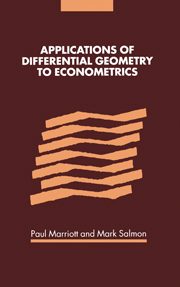Book contents
- Frontmatter
- Contents
- List of figures and tables
- List of contributors
- Editors' introduction
- 1 An introduction to differential geometry in econometrics
- 2 Nested models, orthogonal projection and encompassing
- 3 Exact properties of the maximum likelihood estimator in exponential regression models: a differential geometric approach
- 4 Empirical likelihood estimation and inference
- 5 Efficiency and robustness in a geometrical perspective
- 6 Measuring earnings differentials with frontier functions and Rao distances
- 7 First-order optimal predictive densities
- 8 An alternative comparison of classical tests: assessing the effects of curvature
- 9 Testing for unit roots in AR and MA models
- 10 An elementary account of Amari's expected geometry
- Index
5 - Efficiency and robustness in a geometrical perspective
Published online by Cambridge University Press: 09 March 2010
- Frontmatter
- Contents
- List of figures and tables
- List of contributors
- Editors' introduction
- 1 An introduction to differential geometry in econometrics
- 2 Nested models, orthogonal projection and encompassing
- 3 Exact properties of the maximum likelihood estimator in exponential regression models: a differential geometric approach
- 4 Empirical likelihood estimation and inference
- 5 Efficiency and robustness in a geometrical perspective
- 6 Measuring earnings differentials with frontier functions and Rao distances
- 7 First-order optimal predictive densities
- 8 An alternative comparison of classical tests: assessing the effects of curvature
- 9 Testing for unit roots in AR and MA models
- 10 An elementary account of Amari's expected geometry
- Index
Summary
Introduction
The aim of this chapter is to construct a general geometrical setting, based on Hilbert space, in which one may study various estimation techniques, in particular with respect to efficiency and robustness. Given the sort of data one wishes to study, such as continuous, discrete, etc., the set of data-generation processes (DGPs) capable of generating data of that sort is given the structure of a Hilbert manifold. Statistical models will be treated as submanifolds of this underlying manifold.
Geometrical methods are frequently used in the study of statistical inference. One important strand of the literature is presented in Amari (1990), whose numerous earlier papers were inspired by some very abstract work of Chentsov (1972) and led to the concept of a statistical manifold. Other review papers and books in this tradition include Barndorff-Nielsen, Cox and Reid (1986), Kass (1989), Murray and Rice (1993), and Barndorff-Nielsen and Cox (1994). Most of this work makes use of finite-dimensional differential manifolds, which are usually representations of models in the exponential family.
Infinite-dimensional Hilbert space methods are extensively used in another strand of literature, for which the most suitable recent reference is Small and McLeish (1994). This book contains numerous references to the original papers on which it builds.
Information
- Type
- Chapter
- Information
- Applications of Differential Geometry to Econometrics , pp. 151 - 183Publisher: Cambridge University PressPrint publication year: 2000
Accessibility standard: Unknown
Why this information is here
This section outlines the accessibility features of this content - including support for screen readers, full keyboard navigation and high-contrast display options. This may not be relevant for you.Accessibility Information
- 1
- Cited by
